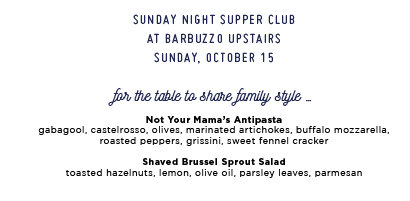 A couple weeks ago, I saw the item “gabagool” on the menu of a local Philly restaurant. Having lived in Philadelphia for a while, I had the vague feeling this was just an ironic nod to the way people here pronounce the delicious, ham-like meat, “Capicola.” But, since it was printed out on a real, official menu of a nice center city restaurant, I thought I might be mistaken. Maybe “gabagool” was just one more variation on Italian meats and cheeses that I didn’t know.
A couple weeks ago, I saw the item “gabagool” on the menu of a local Philly restaurant. Having lived in Philadelphia for a while, I had the vague feeling this was just an ironic nod to the way people here pronounce the delicious, ham-like meat, “Capicola.” But, since it was printed out on a real, official menu of a nice center city restaurant, I thought I might be mistaken. Maybe “gabagool” was just one more variation on Italian meats and cheeses that I didn’t know.
So, in Citizen Sociolinguist form, I turned to (Gaba)Google. What did I learn?
As I suspected, Gabagool is “just” another way of saying “Capicola.” The top definition on Urban Dictionary (the first google hit), also supplies a couple useful analogs in the “Napolitan” dialect: Manigot (for Manicotti )and Rigot (Ricotta).
One Urban Dictionary author also knew a little linguisticky detail about voiced and unvoiced consonants, and came up with a pattern for these special words.

In addition to Urban Dictionary entries, (gaba)google brought up quite a few videos associated with “Gabagool”– Citizen Sociolinguists have a special knack for recognizing and displaying all the non-linguistic elements of a scene. These non-linguistic aspects of context provide crucial meaning to unique ways of speaking. “Gabagool” is not simply a “Napolitan”, voiced-consonant way of saying capicola. It is something you say in a certain special context while looking a certain way.
By consulting the citizen sociolinguists posting on Youtube, we begin to see all the other features of a scene that go into using the word “gabagool.” The most popular video example, by far, is this clip from the Sopranos, in which Silvio Dante, outrageously played by Stephen van Zandt, demands, “Gabagool! Over here!”
features of a scene that go into using the word “gabagool.” The most popular video example, by far, is this clip from the Sopranos, in which Silvio Dante, outrageously played by Stephen van Zandt, demands, “Gabagool! Over here!”
Everything in this scene that surrounds Silvio Dante’s “gabagool” illustrates the context of New Jersey Italian American family. And, as Meadow Soprano (Jamie-Lynn Sigler) illustrates in her iconic line, “Don’t eat gabagool, Grandma, it’s nothing but fat and nitrates,” even speakers of the word gabagool who don’t know much Italian (or feel any reverence for the cuisine) can fluently speak this variation. According to Atlas Obscura, you will not even hear “gabagool” (or proshoot or manigot for that matter) if you go to Southern Italy, their ostensible original homeland. 
Gabagool, instead, serves as an emblem for identity—say “Gabagool, ovah here!” and you are not simply demanding some capicola, you are being a specific type of Italian American, probably born-and-raised in the tri-state area. Even the comments from the Sopranos’ YouTube clip (and another compilation of all the gabagool scenes in the series) zero in on love for just this word:

Of course, it is possible to seriously misuse the word “Gabagool.” In another popular video that came to the top in my google search, Michael, from the show The Office, tries to use a Sopranos style “gabagool” in a standard business lunch restaurant and makes no sense at all.

Michael is trying to impress their Italian American client at lunch, but instead shows a (typical-for-his-character) dramatic misreading of context, using “Gabagool” in a setting that is far more like Applebees than a gathering in the Sopranos’ living room. The waitress has no idea what he is talking about, (and who knows what the Italian American client thinks!).
Let’s bring this all together then—the (gaba) good, the bad, and the ugly: Gabagool epitomizes something wonderful about learning language: You only need know a few words to join in and start speaking. However, to use those words effectively, you also need to know much more about who uses them, in what settings, and how. In the case of capicola, you must saaaaavor the gabagool—despite the fat and nitrates. The tenuous connection of gabagool to Italy also illustrates that words aren’t locked into being part of “A Language.” Inevitably, communities of speakers develop their own uniquely local communicative flair. However, that local flair requires not simply knowledge of a word, or its voiced consonants, but a sense of context. As Michael-from-The-Office illustrates, if you don’t understand when, where, and how to use one of these emblematic words, you might be better off just not using it.
Do you have certain emblematic words you say, that mark you as part of an inside group? What are they? In what settings do you say them? What effects do they have? Have you ever made an error or faux pas when attempting to speak an emblematic word like gabagool? Please share your stories and comment below!
It is so thought provoking to think about emblematic words. One example is in Arabic, as-salaam ‘alaykum. ( Peace be upon you). That’s how Muslims greet each other. I used to live in Yiwu, China. Many middle east people live there. No matter which country they are from, on the street they would greet each other with as-salaam ‘a laykum, smiling and talking like friends. Chinese shopkeepers learn to use the phrase to greet their client. It works well. My thoughts go beyond the words. Accent does have the similar effect of words like, Gabagool. For instance, in China, we have many dialects. When we learn Mandarin, often times, the accent brings in. Some of the accent are so distinct that we can instantly spot where the speaker come from. People on the train may start a conversation when they hear similar accent. The similar background somehow bind people. I think it is similar in English-speaking countries. ( BTW we do not offer fortune cookies in China. I knew fortune cookies in US when my friend first asked me about it. )
LikeLiked by 1 person
gabagool
LikeLike